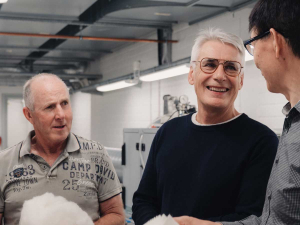Top wool advocate bales out
The conversion of productive farmland into trees has pretty much annihilated the wool industry.
 From left to right: Colin Campbell from Ovis Global, Nick Davenport from Lanaco, and Kevin Liu from BlueAir in Stockholm
From left to right: Colin Campbell from Ovis Global, Nick Davenport from Lanaco, and Kevin Liu from BlueAir in Stockholm
In a breakthrough for New Zealand wool technology, woollen air filters by local company Lanaco, will be used by Unilever-owned air purifier manufacturer Blueair.
Lanaco has hailed the new partnership as a truly significant step in the commercialisation of its Ecostatic wool filters and a boost for the air purifier market that has previously relied on synthetic air filters. Blueair operates in 60 countries.
Lanaco’s Ecostatic wool filters are already known far and beyond. They have made it into outer space on NASA rockets for Moon and Mars missions, and were part of the facemasks that kept the New Zealand team at the 2020 Tokyo Olympics free of COVID. Now they have found a home on Earth.
Lanaco founder and chief executive Nick Davenport says the new partnership with Blueair, a leading Swedish air wellness pioneer, represents a step-change in the global air filtration market. Blueair is the first to integrate electrostatic technology into its range of portable air purifiers.
“Blueair's dedication to innovation, sustainability and quality resonates with our core values at Lanaco,” Davenport says.
“Our company has developed wool-based filter media because wool provides both the basis for true performance and the best sustainability credentials. We are thrilled that our partnership with Blueair captures this capability whilst also recognising the environmental benefits of woollen filters as well.
“Just as Icebreaker did for wool clothing, Lanaco is bringing its branded New Zealand wool technology to the global filtration market by partnering with one of Europe’s greatest consumer goods companies.”
Blueair chief executive Andy Lu says partnering with Lanaco to produce the industry's first woollen, biodegradable filter is not just a milestone for Blueair, “but a transformative moment for the entire air purification industry”.
The electrostatic filter technology is uniquely supported by the established Ovis Global Astino sheep breeding programme, which is pivotal in its success as wool with superior filtration performance is being bred for. This initiative presents a long-term growth opportunity for the farming sector, with thousands of tonnes of New Zealand wool potentially benefiting from this scientifically sophisticated application of wool as a novel biomaterial.
Targeting a global filter media market valued at over $US8 billion, Lanaco says the Unilever partnership is the first of several high-volume market opportunities that Lanaco is presently progressing to full commercialisation.
NZPork says the Government needs to strengthen its proposed planning laws to ensure New Zealand's pig farmers can continue to produce pork.
Good news for kiwifruit growers - a record crop with forecast per hectare returns at record levels for all fruit categories for the 2025-26 season.
As guests gathered on what is known as the Speaker's Lawn - a beautifully manicured patch of grass behind the main buildings of Parliament - to mingle and enjoy a lamb chop to celebrate National Lamb Day, the mood was very much upbeat.
Global dairy prices are on a roll, recording a fourth consecutive jump on the Global Dairy Trade (GDT) auction this year.
Booming primary sector exports are helping lift earnings for farm service providers.
The world is waking up to the disadvantages of carpets derived from petrochemicals, creating opportunities for New Zealand strong wool.

OPINION: Here w go: the election date is set for November 7 and the politicians are out of the gate…
OPINION: ECan data was released a few days ago showing Canterbury farmers have made “giant strides on environmental performance”.